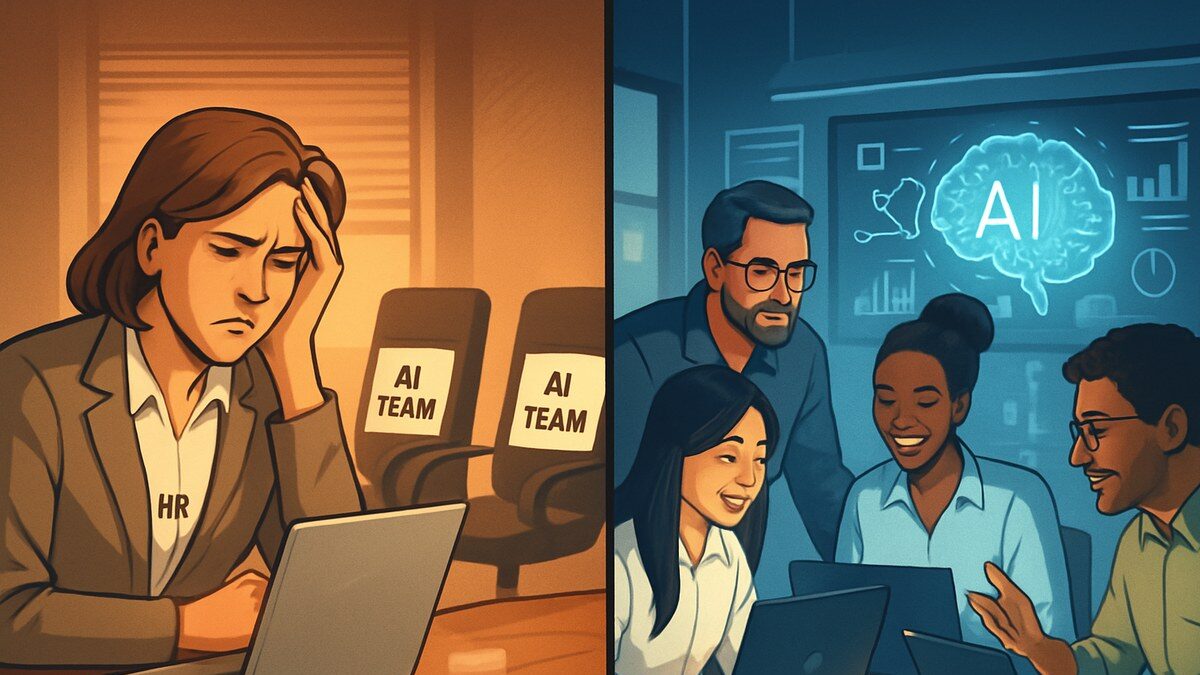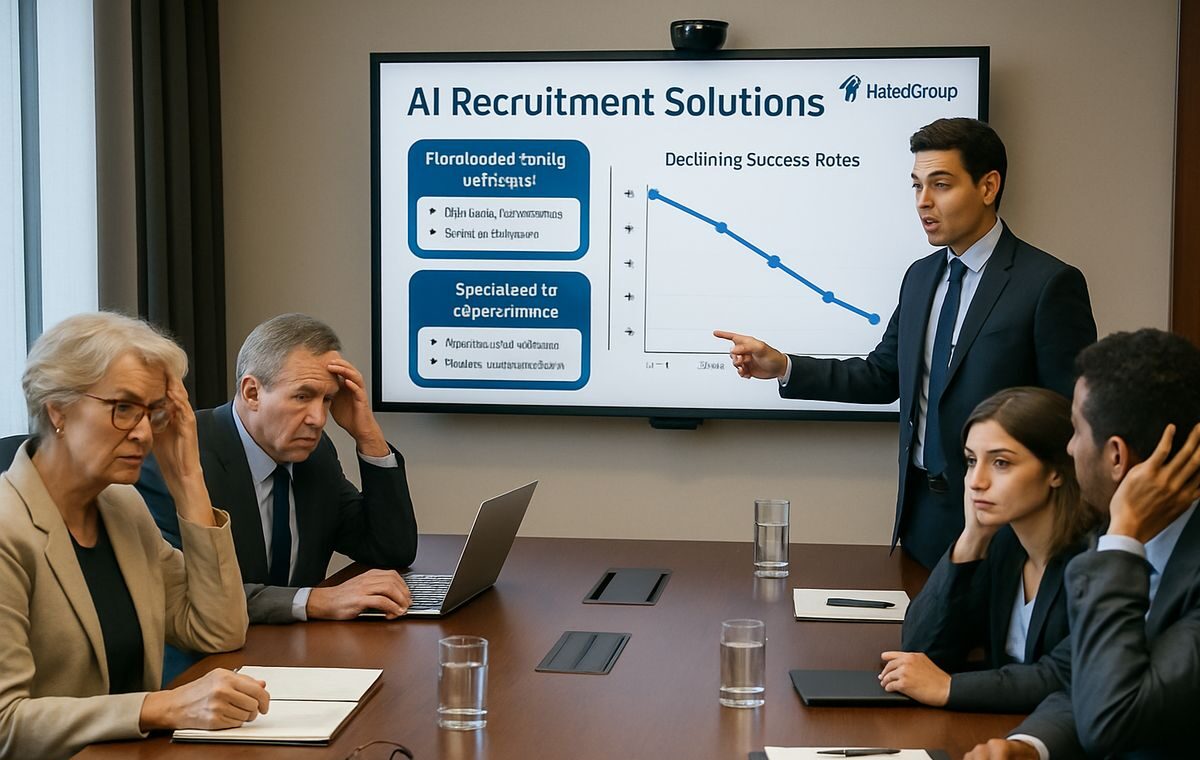Why Companies Fail to Hire AI Talent: The artificial intelligence talent shortage has reached crisis levels, with companies across industries struggling to build competitive AI teams despite unprecedented demand and attractive compensation packages. Understanding why companies fail to hire AI talent has become essential for organizations seeking to leverage AI for competitive advantage and digital transformation.
At MahadGroup, we’ve analyzed hundreds of failed AI recruitment attempts and identified recurring patterns that prevent even well-funded organizations from securing top AI professionals. These failures often stem from fundamental misunderstandings about AI talent expectations, market dynamics, and effective recruitment strategies.
The consequences of unsuccessful AI hiring extend far beyond empty positions. Organizations that fail to attract AI talent face delayed digital transformation initiatives, reduced competitive positioning, and missed opportunities in rapidly evolving markets where AI capabilities determine success.
Why Companies Fail to Hire AI Talent: The Growing AI Talent Crisis
The demand for AI professionals has increased exponentially while the supply of qualified candidates remains severely constrained. Universities graduate thousands of computer science students annually, but only a fraction possess the specialized skills, practical experience, and innovative mindset required for effective AI development and implementation.
Why Companies Fail to Hire AI Talent: This talent scarcity has created a hyper-competitive market where top AI professionals receive multiple offers, command premium salaries, and maintain significant leverage in employment negotiations. Companies that approach AI recruitment with traditional hiring methods consistently fail to compete effectively for elite talent.
The most successful AI professionals are rarely actively job searching. Instead, they’re typically engaged in cutting-edge research, building innovative products, or pursuing entrepreneurial ventures. This reality means that companies must adopt proactive, relationship-based recruitment strategies rather than passive job posting approaches.
Critical Mistake #1: Unrealistic Job Requirements
Why Companies Fail to Hire AI Talent: One primary reason why companies fail to hire AI talent involves creating job descriptions that combine unrealistic skill requirements with insufficient compensation or career development opportunities. Many organizations list dozens of technical requirements while offering entry-level salaries or limited growth potential.
Effective AI roles require deep expertise in specific domains rather than superficial knowledge across multiple areas. Companies that demand expertise in machine learning, computer vision, natural language processing, robotics, and quantum computing while offering junior-level compensation inevitably struggle to attract qualified candidates.
The most successful AI recruitment strategies focus on core competencies and growth potential rather than exhaustive skill checklists. Top AI professionals value opportunities to deepen their expertise and tackle challenging problems more than comprehensive technical requirements that may not align with actual role responsibilities.
Compensation Misalignment
Why Companies Fail to Hire AI Talent: AI professionals command premium salaries that reflect their rare skills and high market demand. Companies that benchmark AI compensation against traditional software development roles consistently fail to compete for top talent. Senior AI engineers and research scientists often earn 50-100% more than comparable software engineering positions.
Equity participation, research budgets, and publication opportunities often matter as much as base salaries for AI professionals. Companies that focus solely on cash compensation without considering comprehensive package value frequently lose candidates to organizations offering better overall career advancement opportunities.
Critical Mistake #2: Poor Technical Assessment Methods
Traditional coding interviews and algorithmic challenges often fail to evaluate AI-specific competencies effectively. Many companies rely on generic technical assessments that don’t reflect the complex problem-solving, research capabilities, and domain expertise required for AI roles.
Why Companies Fail to Hire AI Talent: AI professionals excel at identifying appropriate methodologies, designing experiments, and interpreting results rather than implementing predetermined algorithms. Assessment methods must evaluate creative problem-solving, research thinking, and the ability to work with uncertain, incomplete data sets.
The best AI assessment approaches involve portfolio review, research discussion, and collaborative problem-solving sessions that mirror actual AI development workflows. Companies that rely exclusively on standardized technical tests consistently miss candidates with strong practical AI capabilities.
Portfolio and Research Evaluation
AI professionals demonstrate their capabilities through research publications, open-source contributions, and innovative project portfolios. Companies that focus primarily on employment history and formal credentials often overlook candidates with exceptional practical skills developed through independent research or entrepreneurial ventures.
Why Companies Fail to Hire AI Talent: Effective AI assessment includes detailed portfolio review, discussion of research methodologies, and evaluation of candidates’ ability to communicate complex technical concepts to diverse audiences. This comprehensive approach identifies professionals capable of translating AI research into practical business applications. accelerating across all business.
Critical Mistake #3: Inadequate Cultural Integration
Why Companies Fail to Hire AI Talent: AI professionals often come from academic or research backgrounds with different expectations regarding work environments, collaboration styles, and career development compared to traditional corporate employees. Companies that fail to understand and accommodate these cultural differences struggle to attract and retain AI talent.
Research-oriented professionals value intellectual freedom, publication opportunities, and collaboration with other experts. Organizations that impose restrictive corporate policies, limit external engagement, or discourage research publication consistently struggle with AI talent acquisition and retention.
The most successful AI teams combine corporate resources with academic flexibility, allowing professionals to pursue research interests while contributing to business objectives. This balance requires thoughtful cultural integration and management approaches specifically designed for AI professionals.
Academic Partnership and Research Opportunities
Why Companies Fail to Hire AI Talent: Many top AI professionals maintain connections with academic institutions and value opportunities to contribute to research advancement. Companies that restrict academic collaboration or prohibit research publication often fail to attract candidates who prioritize intellectual contribution alongside commercial success.
Organizations that embrace academic partnerships, support conference participation, and encourage research publication often attract higher-quality AI candidates who view these opportunities as valuable career development benefits.
Critical Mistake #4: Insufficient Leadership Understanding
Senior executives who lack understanding of AI capabilities, limitations, and development processes often create unrealistic expectations that deter qualified candidates. When leadership demonstrates limited AI knowledge, top professionals question the organization’s commitment to meaningful AI initiatives.
Why Companies Fail to Hire AI Talent: AI professionals seek opportunities to work on impactful projects with supportive leadership that understands the iterative, experimental nature of AI development. Companies where executives expect immediate, guaranteed results from AI initiatives consistently struggle to attract experienced professionals.
Educational initiatives that help leadership understand AI development processes, timelines, and success metrics create more attractive environments for AI professionals seeking organizations committed to long-term AI investment and realistic project management.
Strategic Vision and Resource Commitment
AI talent gravitates toward organizations with clear AI strategy, adequate resource allocation, and long-term commitment to AI initiatives. Companies that treat AI as experimental or secondary priorities fail to compete for professionals seeking stable, impactful career opportunities.
Demonstrating strategic commitment through dedicated AI budgets, infrastructure investment, and integration with core business processes signals serious organizational commitment that attracts top-tier AI professionals.
The MahadGroup Solution
At MahadGroup, we address the fundamental reasons why companies fail to hire AI talent through comprehensive recruitment strategies that combine market intelligence, relationship building, and strategic positioning. Our approach recognizes that AI recruitment requires specialized expertise and proven methodologies. ai talent shortage.
Market Intelligence and Compensation Analysis
Our extensive market research ensures clients offer competitive compensation packages that reflect current AI talent market realities. We provide detailed analysis of salary benchmarks, equity expectations, and benefit preferences across different AI specializations and geographic markets.
This intelligence enables clients to position opportunities attractively while maintaining reasonable budget parameters. Our compensation guidance helps organizations compete effectively without overpaying or creating internal equity issues.
Relationship-Based Recruitment
Why Companies Fail to Hire AI Talent: Our established relationships with AI professionals, academic institutions, and research organizations provide access to passive candidates who aren’t actively job searching. These relationships enable proactive engagement with top talent before they enter the broader recruitment market. required skills are increasingly.
We maintain ongoing connections with AI community leaders, conference speakers, and research contributors, ensuring continuous access to emerging talent and industry developments that inform our recruitment strategies.
Technical Assessment Expertise
Why Companies Fail to Hire AI Talent: Our team includes AI professionals who understand the nuances of evaluating candidates across different AI specializations. We design assessment processes that accurately evaluate practical capabilities while respecting candidates’ time and expertise.
Our assessment methods combine portfolio review, technical discussion, and practical problem-solving that reflects actual AI development workflows, ensuring accurate evaluation of candidates’ potential contributions.
The path to successful AI talent acquisition requires understanding that these professionals represent a unique market segment with distinct expectations, motivations, and career priorities. Organizations that recognize why companies fail to hire AI talent can implement strategies that attract and retain the elite professionals necessary for AI-driven competitive advantage.
Success in AI recruitment demands specialized expertise, market intelligence, and proven methodologies that address the unique challenges of this talent market. With proper guidance and strategic approach, organizations can build the AI teams necessary for thriving in an increasingly AI-driven business environment.



